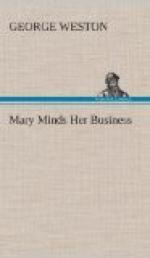It was in December that Mary’s great idea began to assume form. She wrote to the American Ambassadors in Great Britain and France for any documents which they could send her relating to the subject so close to her heart. In due time two formidable packages arrived at the house on the hill.
Mary carried them into the den and opened them with fingers that trembled with eagerness.
Yes, it was all true.... All true.... Here it was in black and white, with photographs and statistics set down by impartial observers and printed by government. Generally a state report is dry reading, but to Mary at least these were more exciting than any romances—more beautiful than any poem she had ever read.
At last woman had been given a chance to show what she could do. And how she had shown them!
Without one single straining effort, without the least thought of doing anything spectacular, she had gently and calmly taken up men’s tools and had done men’s work—not indifferently well—not in any makeshift manner—but “in all cases, even the most technical, her work has equalled that previously done exclusively by man. In a number of instances, owing to her natural dexterity and colour sense, her work, indeed, has been superior.”
How Mary studied those papers!
Never even at college had she applied herself more closely. She memorized, compared, read, thought, held arguments with herself. And finally, when she was able to pass any examination that might be set before her, she went down to the office one day and sent for Mr. MacPherson, the master mechanic.
He came—grey haired, grim faced, a man who seemed to keep his mouth buttoned-and Mary asked him to shut the door behind him. Whereat Mac buttoned his mouth more tightly than before, and looked grimmer, too, if that were possible.
“You don’t look a day older,” Mary told him with a smile. “I remember you from the days when my father used to carry me around—”
“He was a grand man, Miss Mary; it’s a pity he’s gone,” said Mac and promptly buttoned his mouth again.
“I want to talk to you about something,” she said, “but first I want you to promise to keep it a secret.”
He blinked his eyes at that, and as much as a grim faced man can look troubled, he looked troubled.
“There are vera few secrets that can be kept around this place,” was his strange reply. “Might I ask, Miss Mary, of what nature is the subject?” And seeing that she hesitated he added, first looking cautiously over his shoulder, “Is it anything, for instance, to do wi’ Mr. Woodward? Or, say, the conduct of the business?”
“No, no,” said Mary, “it—it’s about women—” Mac stared at her, but when she added “—about women working in the factory,” he drew a breath of relief.
“Aye,” he said, “I think I can promise to keep quiet about that.”
“Isn’t it true,” she began, “that most of the machinery we use doesn’t require a great deal of skill to run it?”




